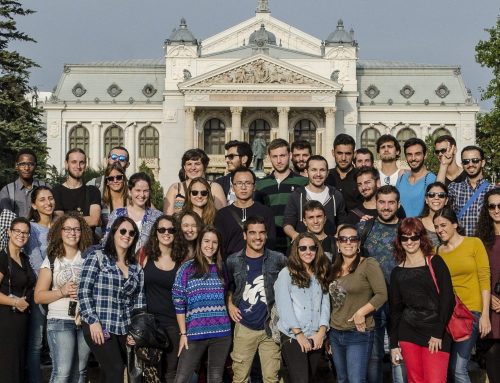”Several economic models and analytic instruments used for the study of economic systems in general or of some specific domains (e.g. the financial market, insurance, health services, public decisions, etc.) are the fruit of his brilliant intellectual creativity and bear his name”, it was mentioned in the Laudatio, read by the Rector of the university, Professor Vasile Ișan, at the awarding ceremony.
The Joan Kenney Professor of Economics and Professor of Operations Research, Emeritus at Stanford University, Kenneth Arrow received in 1972 the Nobel Prize for Economic Sciences.
After the awarding ceremony of the Doctor Honoris Causa honorary title, Kenneth Arrow delivered the conference ”Knowledge, Belief, and the Economic System”. From the very beginning of his intervention, professor Arrow referred to the connection between these three apparently independent concepts, preffering to use a funny anecdote, instead of technical terms:
”After the prohibition was over in the USA, a brewery company chose to advertise its business in the following manner: they bought space in a newspaper and presented six models. The consumers were invited to vote for their favourite model and, if they guessed the winner, they would get a prize. The economist John Keynes”, explained Kenneth Arrow, ”showed that it was not lucrative to vote for the model that you prefered, but it was more efficient to vote for the model you thought it would win”.
”Thus, economy is based on the expectations about other people’s expectations”, Kenneth Arrow stressed out. If the price is enough for the existing markets to establish the equilibrium, beliefs play a key role in adjusting the market when it comes to prospective productions – it is the case of the markets for the new car models, that will be available for sale in about 5 years after being designed. Because they depend so much on beliefs, these markets are exposed to a higher risk level.”
The Nobel Prize laureate continued his incursion into the subject by investigating the role the information plays in modelling beliefs. Information in Economics changes beliefs; on the basis of new information, the players on the market change their expectations.
Thus, there’s a series of regulations concerning information, such as the obligation of the companies listed on the stock exchange to make public their statements of assets and liabilities and also the access to the complete technical information of a product.
In the end of his conference, Professor Arrow pointed out the fact that the state and the specialized financial entities are also sometimes defective in gettting and interpreting information (as proven by the latest economic crisis), and the market itself is sometimes based rather on expectation than information. In conclusion, the Nobel Prize laureate mentioned that the market needs several protection mechanisms and prevention measures against volatility.
The conference of the American economist was followed by the lecture deliver by the mathematician Solomon Marcus, who underlined the importance of Kenneth Arrows’ well-known theoretical accomplishment – the so-called imposibility theorem – and its applicability in several fields of knowledge.
In this respect, the academician Solomon Marcus opened his lecture with a ”translation” of the imposibility theorem into a language more accessible to everyone. ”We can define several requirements in different situations, each of them individually looking easy to accomplish and natural. These requirements seem independent from each other, but in fact they are not and they cannot be carried out simultaneously. Their dependency is hidden.”
He continued presenting several areas and situations that can be analyzed through this theory: Heisenberg’s Uncertainty Principle, in Physics; the Communication Theory; the request to tell the truth and the request to be precise, in Humanities.
The academician Solomon Marcus ended his speach by reffering to Kenneth Arrow’s Romanian roots, his grandparents originating from Northern Moldavia.
The conference of the Nobel Prize laureate Kenneth Arrow represented the inaugural lecture of the Grigore Moisil Institute, that will be organising in 2014 a series of conferences with world’s leading scientists and thinkers of today.
Photo Gallery

